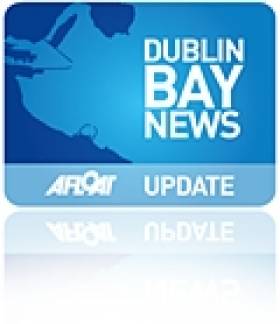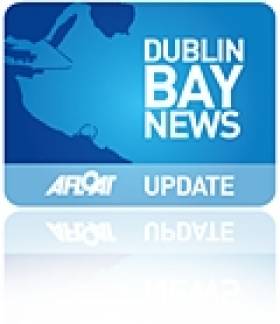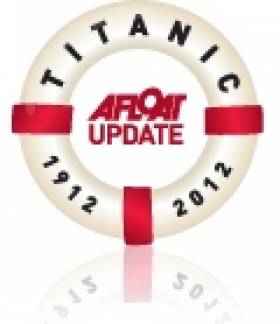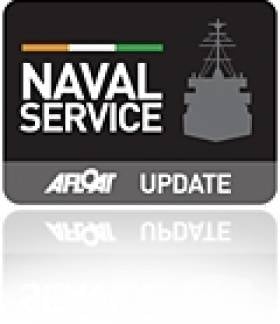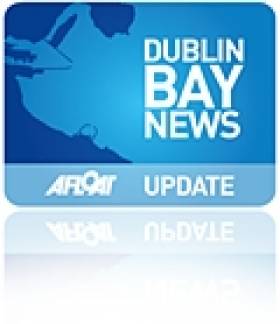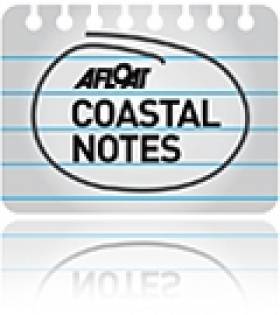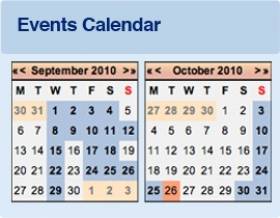Displaying items by tag: M.I.I.
Easter Sunday Marks Rebirth of Mariners Maritime Museum
#MARTIME MUSEUM AT EASTER - Earlier this week Dun Laoghaire's maritime museum re-opened its doors to the public after a €4m renovation project was carried out on the apt venue of the former Mariners Church, which incidentally closed on this Easter Day forty years ago, writes Jehan Ashmore.
With a new lease of life the extensively renovated and upgraded museum can look forward to a future. Visitors enter the museum at a new entrance, where in the reception foyer there is a souvenir shop, beyond that in the main body or nave are exhibits displayed, each telling a story and for children there is a Knott Station. To view the initial exhibits on display, click HERE.
In addition there is new facility in the form of a café, which was much needed and where two new stained -glass windows by Peadar Lamb feature, they were sponsored by the Dun Laoghaire Harbour Company. As for the original stained-class windows they were restored to their full glory.
The renovation began in 2006 and was funded by the Government which led to a three-phrased project that involved work carried out from the re-roofing right down to the floorboards. Walls were re-plastered, electric systems modernised and wheel chair-lift and ramps installed.
Work also took place to clean the exterior of the stone-cut granite building hewn from Dalkey Quarry and which led to the consecration of the Kingstown Episcopalian Mariners Church in 1843.
After many generations of mariners and their families, parish numbers dwindled and its use as place worship ended on Easter Sunday 1972. The Maritime Institute of Ireland which runs the museum relocated two years later having had a smaller museum sited along the town's harbour waterfront.
For the next three decades the museum which has attracted locals and visitors from home and overseas, eventually had to close due to deteriorating conditions of an aging building.
Now that the museum is up and running, the M.I.I. which is staffed by volunteers has in recent years also had the support of a FAS scheme of workers, which according to the institute have been invaluable.
The museum is open 11am to 5pm Tuesday to Sunday and every Bank Holiday, for further information visit: www.mariner.ie
New Lease of Life for Reopened Maritime Museum
#MARITIME MUSEUM REOPENING – It is good to report positive news, particularly the much awaited reopening of the Maritime Institute of Ireland's maritime museum in Dun Laoghaire, which is to take place today, writes Jehan Ashmore.
Since 2006, the museum secured vital Government grants to undertake repair, renovation and improvement works of the former Church of Ireland church built in 1837 which could accommodate up to 1,400 people. Due to dwindling parish numbers the church closed on Easter Sunday 1972 and two years later the museum moved in.
Over the next three decades visitors enjoyed the unique and apt setting of the former Mariners Church. However as the years rolled the structure of the building was in need of urgent attention which led to the closure in 2004.
The extensive work has included the replacement of the roof, treatment of dry rot, repointing and cleaning of the stonework, replaced plasterwork, repair of the stained glass windows, installation of new lighting and heating systems and wheelchair accessibility provided.
Initially the museum will only use the ground floor, having said that a new layout is presented with several 'stories' centred around these exhibits, to read more about the exhibits click HERE.
In addition children will be entertained by a Knot Station and there is to be a souvenir shop and coffee dock. Opening hours are 11am to 5pm Tuesday to Sunday, including Bank Holidays, for further information visit: www.mariner.ie
The Maritime Institute of Ireland celebrated its 70th anniversary last year, and was established primarily to highlight the importance of an Irish mercantile fleet, the role of ports and shipping, fishing and to recognise and foster our maritime heritage.
Members can join the Institute with the benefits of accessing the museum (covering admission) runs a lecture programme, issue newsletters, host and support commemorations and conducts research. As a voluntary organisation they also welcome new recruits.
The instiute's patron is President Michael D. Higgins who is to officially reopen the museum in early June.
Music & Talk Tribute to Titanic
#TITANIC – The Maritime Institute of Ireland is to host a musical tribute and illustrated talk to mark the centenary of the Titanic shipping disaster. The evening event (starting at 8pm) is to be held on Thursday 12th April in the Maritime Museum, Dun Laoghaire.
The musical tribute will be led by uillinn piper Eamon Galdubh – similar music to that played in the 2nd and 3rd class compartments on the Titanic. The illustrated talk will be presented by well-known deep sea diver Rory Golden, the first Irishman to see the wreck of the Titanic. He was also the first person to touch the ship's wheel since the ship's Captain did in 1912.
Tickets for the event are available at €10 each (concessions €5) from Costello Jewellers, 1 Northumberland Avenue, Dun Laoghaire. In addition tickets can be purchased from the museum which is to reopen to the public next week on Tuesday 3rd April. For more visit www.mariner.ie
Lecture: The East India Company in Kinsale
#LECTURE - This month's lecture organised by the Maritime Institute of Ireland (M.I.I.) is about 'The East India Company in Kinsale', presented by Paddy O'Sullivan.
The lecture will be held next Thursday (15th March) starting at 8pm and as usual takes place in the Stella Maris Seafarers Club on Beresford Place, close to Busaras and behind the Customs House.
O'Sullivan is an engineer, diver, author, and lecturer has uncovered a vast amount of information about the activities of the East India Company in Munster, regarding ship-building, trading, iron smelting, and cannon casting.
All are welcome to attend the evening where a bar and refreshments are available. A voluntary contribution is at the door. The organisers would be pleased for anyone to kindly forward details about the lecture programme, held monthly (third Thursday) at the city-centre venue.
Public transport: The nearest DART stations are Connolly Station and at Tara Street in addition to the LUAS (Red) line stop at Busáras. Car parking is located in the Irish Life Mall (ILAC) on Lower Abbey Street. For information of the lecture programme call 086 150 3766 and by visiting www.mariner.ie/lectures-spring-2012
Homage Paid to Irish Founder of Argentinian Navy
#ADMIRAL BROWN- As Wexford is to host The John Barry Maritime Festival this summer, the father of the US Navy and commodore is held in the same league of Admiral William Brown, who founded the Argentinian Navy, who was remembered in a ceremony over the weekend in Buenos Aires, writes Jehan Ashmore.
The commemoration was to mark the 155th anniversary of William Brown's passing which took place at the Recoleta Cemetery, which was headed by Vice Admiral Carlos Alberto Paz, Chief of Staff of the Argentine Navy.
Among those attending were the Irish Ambassador, Mr. James McIntyre, the Chairman of the National Brownian Institute, Prof. Emilia Menotti, the President of the Naval Club, Vice Admiral Eduardo R. Llambi (Ret.) and City Council Officials.
The Navy General Directorate for Education marching band was also present, as well as Officer Cadets from the Admiral Brown Naval Lyceum (Reserve Officers' Academy). The Irish flag was carried alongside the host country by officers of the HQ Security Marine Bn.
For more about the event which included Santiago L. Aversa who represented the Irish branch of the Maritime Institute of Ireland (click HERE) and where its maritime museum in Dun Laoghaire is due to reopen early next month as previously reported on Afloat.ie
In 2006 the Naval Service 'flagship' L.É. Eithne (whose adopted homeport is Dun Laoghaire) under the command of Commodore Mark Mellett, made a historic first for the Naval Service when visiting Argentina and other South American ports.
In the same year two identical statues of the admiral were unveiled, one in Dublin's Docklands at Admiral Brown Way and Westport, Co. Mayo where the admiral hailed from.
Admiral Brown won victories against the Spanish and Brazilian fleets and as such he is regarded as a national hero, where in excess of 1,000 streets, 400 statues and venues such as stadiums (including football teams) schools, several towns, and a major city bears his name.
- naval service
- Argentinian Navy
- L.E. Eithne
- Commodore John Barry
- Admiral William Brown
- Commodore Mark Mellett
- M.I.I.
- Maritime Institute of Ireland
- Mariners Church Dun Laoghaire
- Maritime Museum Dun Laoghaire
- Dublin Docklands
- The John Barry Maritime Festival
- Admiral Brown Way
- Irish Ambassador McIntyre
- Westport Co Mayo
- Wexford Town
Dun Laoghaire's Maritime Museum to Re-Open
#MARITIME MUSEUM-The much awaited re-opening of the Maritime Museum in Dun Laoghaire, Co. Dublin is to take place in April, writes Jehan Ashmore.
The museum which is near to Dun Laoghaire Harbour's East Pier, is to reopen on Tuesday 3rd April between 11am t- 5pm. Throughout the season, these same visiting hours apply Tuesdays to Sundays, though the museum will be closed on Mondays.
To read more about the initial exhibits on display (click HERE) in the apt surroundings of the former Mariners Church, where major and essentail renovation work took place over several years. The museum which is run by the Maritime Institute of Ireland (M.I.I.) celebrated its 70th anniversary last year and with the reopening they can now look forward to a new and exciting era.
Located on High Terrace, a Cul-de-Sac that links the town's main shopping thoroughfare on Georges Street Upper to The Metals, the pedestrian walkway –is only minutes away from the Dun Laoghaire DART station.
Car parking is limited in the immediate vicinity though there are car-parking facilities nearby in the Pavilion which is accessed along the harbour waterfront (Queens Road) and the Dun Laoghaire Shopping Centre approached from Marine Road.
In addition to visiting the museum the M.I.I. also welcome members and volunteers to assist in hosting lectures, producing newsletters, journals, a library, hosting and supporting commemorations in addition to conducting research and highlighting Irelands maritime heritage. For further information click HERE.
- Dublin Bay News
- Dun Laoghaire Harbour News
- Dun Loaghaire Harbour
- Mariners Church Dun Loaghaire
- Maritime Institute of Ireland (M.I.I.)
- M.I.I.
- Dun Laoghaire Shopping Centre
- Pavillon Car Parking
- The Metals
- Dun Laoghaire DART station
- Dun Laoghaire Harbour''s East Pier
- East Pier, Dun Laoghaire
- Irish maritime heritage
- Irish maritime museums
Lecture: Building Dun Laoghaire Harbour
#LECTURE – This month's lecture organised by the Maritime Institute of Ireland (M.I.I.) is about 'Building Dun Laoghaire Harbour' and is to be presented by Colin Scudds.
The lecture next Thursday (16th February) starts at 8pm and as usual takes place in the Stella Maris Seafarers Club on Beresford Place, close to Busaras and behind the Customs House.
All are welcome to attend the evening where a bar and refreshments are available. A voluntary contribution is at the door. The organisers would be pleased for anyone to kindly forward details about the lecture programme, held monthly (third Thursday) at the city-centre venue.
Public transport: The nearest DART stations are Connolly Station and at Tara Street in addition to the LUAS (Red) line stop at Busáras. Car parking is located in the Irish Life Mall (ILAC) on Lower Abbey Street.
For further information and of the lecture programme, contact 086 150 3766 and visit www.mariner.ie/lectures
Screening Shown of Unique Lives Lost at Sea Ceremony
#MARINERS WITH MEMORIES – At the weekend representatives of the maritime community, relatives and visitors alike attended a screening of the 'Mariners with Memories' ceremony, which was shown in the Maritime Museum, Dun Laoghaire.
The ceremony which took place in Bray Harbour last July, is unique in that it recognises to all those lost to sea throughout the world and especially to those whose grave is the sea.
Shot by Colm Fynes, the film documented the day's proceedings with tributes made at the Co. Wicklow harbour and the flotilla that followed with floral tributes carried out close to the shore.
Captain Tony O'Grady who organised the Mariners with Memories ceremony, thanked all those to the museum and the support of the Maritime Institute of Ireland, whose newly renovated museum was a particularly apt venue, being the former Mariners Church.
Some of the relatives who attended the memorial event in Bray were also at the Dun Laoghaire screening and where they gave moving tributes to loved ones.
Commenting on the poignancy of the screening, Captain O'Grady referred to the on-going tragic events in Glandore Harbour and off the Italian island of Giglio.
He added that those involved in the various services off the West Cork fishing harbour would of liked to have attended but given the circumstances, all the resources were required at the scene.
It is hoped that following the inaugural ceremony, that Mariners with Memories will become an annually held event and the close relationship with the museum continues.
The museum which was especially opened for the screening will remain closed throughout the winter months though is open on an invitation only basis. Officially the museum is due to re-open this Easter, to keep posted of further developments visit www.mariner.ie
Christmas Concert for Maritime Museum
#EVENTS-A light-hearted performance of Christmas Music for the Festive Season is to be held at Christ Church Park Road, Dún Laoghaire in aid of the Maritime Institute of Ireland's museum restoration fund.
All are welcome to the evening's performance by the 'Firhouse Singers' which starts at 7.30 pm on Friday 16th December. Refreshments will be available and an admission of €10.00 at the door.
For additional information about the museum visit www.mariner.ie
National Commemoration Services for Irish Seafarers
#EVENTS-The annual Seafarers Commemoration in Cork will be held at 12 noon, on 28th November in the Port of Cork Offices, Custom House Quay.
The event is organised by the Cork branch of the Maritime Institute of Ireland which also hosted the Seafarers Commemoration in Dublin last Sunday where a mass was held at City Quay Church. Wreaths were laid afterwards at the nearby Irish Seaman's National Memorial, for the men of the Irish mercantile marine who lost their lives at sea during the Second World War.
In the afternoon, a commemoration service of those who lost their lives on Irish ships also took place at Evensong in St. Patricks Cathedral.
As the 'family of the sea' gathered at the City Quay memorial, this provided an opportunity to reflect memories of former seafarers. In recent years, the memorial service has been extended to honour all Irish seafarers who have died at sea.
For further information detailing lists of Irish merchant ships lost during WW2 and the names of those seamen lost, click HERE in addition a short video clip depicting war footage and paintings of Irish vessels lost.
Yesterday marked the 20th anniversary of the sinking of the B&I Line containership Kilkenny in Dublin Bay in which three crew lost their lives in a collision with the German owned Lo/Lo Hasselwerder.
A memorial to the incident in 1991 is located at Irish Continental Group's (ICG) headquarters in Dublin Port, where the former state-run B&I Line was based before privatisation and sold to ICG's ferry subsidiary Irish Ferries.



























